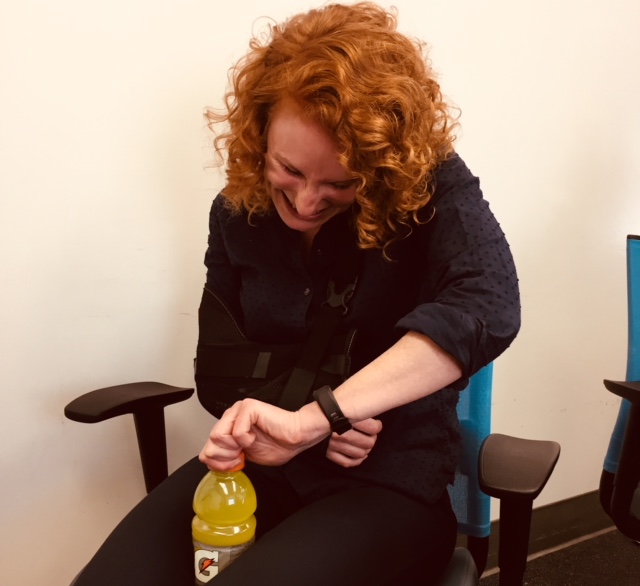
by: Leah B. Rorvig, MD, MS (@GeriPowerMD)
On the third day after my arthroscopic shoulder surgery, I was finally alone at home. My nausea had receded. And I wanted Gatorade. I went to the fridge, pulled out the bottle, and lodged it between my knees. I twisted and twisted with my left hand. I held the lid with a towel. No dice. It wouldn’t budge. Defeated, and still thirsty, I put the bottle back in the fridge. It is still there.
My ADL disability is temporary. I’m in a right arm sling 24 hours a day for the next 6 weeks, during which time I can’t drive or hold anything heavier than a cup of coffee in my right hand. But by next May (6 months from now) my surgeon says I’ll be back to surfing two or three times a week and, best of all, it is very unlikely that I will ever dislocate my right shoulder again (despite my love of sports like surfing and rock climbing). But as a clinical fellow in geriatrics, having a temporary ADL disability has profoundly impacted my perspective on my patients’ functional limitations.
Recently the daughter of a patient of mine (who happens to be in his 90s) told me that he would spend “hours” changing his hearing aid batteries. This gentleman had plenty of support around, and so my immediate response to the patient was “Why don’t you just ask someone to do it for you?” But now that I’ve experienced the shame and frustration of being unable to wash my own dishes—and even my own hair—I can’t believe I would ask such a naïve question so unthinkingly.
Is it necessarily shameful not to be able to wash your own dishes or change your own hearing aid batteries? Of course not. But in our society where self-reliance and independence are core pillars of adulthood, I think I’m not alone in experiencing my own loss of function as a threat to my self-worth.
Curious about what the literature has to say about how we as clinicians should help our patients cope with their declining functional status, I didn’t find much. Yes, I learned that unmet ADL need is associated with all kinds of bad outcomes, including increased risk of hospitalization and even increased mortality. Studies also find that depression in old age is a risk factor for disability, and it is a two-way street – disability is also risk factor for depression. Dissatisfied with what I found, I reached out to one of the leading researchers in my department, and he acknowledged there is very little research on how to manage or improve quality of life among those who already have disability.
What will I do differently as a result of my own unanticipated ADL disability? I’ll stop reflexively minimizing my patients’ functional decline and what it symbolizes. Instead of just asking my patients about their ADL impairments, I now feel I need to also ask about the experience of even having ADL impairments. And then I can begin the real work of understanding what might help those patients who are experiencing distress due to their functional disability. My guess is that it isn’t just an easier to open Gatorade bottle.



